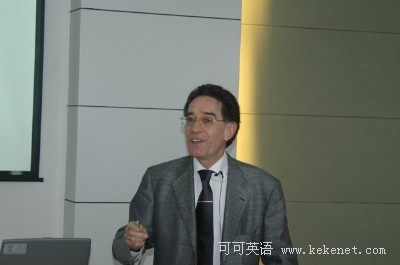
The Classroom Experience. There's no such thing as an all-lecture class at Yale, nor at most other undergraduate colleges or business schools. Professors expect and demand engagement and discussion and students will often pipe up with questions in the middle of a salient point. In most cases, this is not considered rude; I think American students occasionally think of themselves as consumers of the course material, with the right to get their questions answered or theories explored by the professor. In one early class of ours, the professor even wrote to students who had not been participating to request that they speak up more in class.
課堂教學(xué)。 在美國,無論是商學(xué)院或是本科,我們都沒有純粹地“講授式”教學(xué)。教授們通常都希望,甚至要求課堂互動與討論,而學(xué)生們也會在關(guān)鍵點(diǎn)上主動提問。大多數(shù)情況下,我們不認(rèn)為這種“打斷”是不禮貌的,因?yàn)槊绹鴮W(xué)生普遍有一種“消費(fèi)者心理”:我們花錢花時(shí)間來到這個(gè)課堂,就是知識和教授的消費(fèi)者,就有權(quán)得到滿意的答案,有權(quán)請教授當(dāng)下進(jìn)一步闡述不明之處。我聽說有的教授甚至親自寫信給那些課上過于“安靜”的同學(xué),請他們踴躍發(fā)言。
I imagine this is a difficult practice to begin if one comes from a place where the classroom dynamic centers on the professor speaking uninterrupted. But in the States I think students come to class to learn as much from each other as from the teacher, and so participation is viewed positively and seen as part of the unwritten contract. I know from speaking to other American students, we yearned to hear from our international classmates more, especially at the start of the year.
聽說在很多其他國家,比如中國,課堂完全以教授講述為主,教授與學(xué)生之間似乎有一種“不被打斷”的約定俗成。我認(rèn)為,兩者間最大的差別是,我們堅(jiān)信課堂教學(xué)過程中,學(xué)生不但要向教授學(xué)習(xí),更需要互相啟發(fā)、分享見解,所以互動式教學(xué)是有積極意義的,也是一種美國式的約定俗成。而作為美國學(xué)生,我們也真的非常希望在課堂上聽到更多來自國際學(xué)生的聲音。
Of course, not all participation is valid or particularly helpful. Students will often ask questions they should know the answer to, or attempt to build on a point with an off-base comment. Interestingly, I think if a group of students is in a class together consistently (as we are at Yale with our cohort system), the group begins to subtly govern itself and members whose contributions might not be adding to the total experience will get the hint and aim to consider the good of the whole when raising their hand. But shifting between absorbing the lecture and participating in a conversation about it is a key feature of the classroom experience.
當(dāng)然,不得不承認(rèn)的是,我們不可能保證這種互動總是有益且高效的。有些同學(xué)可能會問一些理應(yīng)在課前閱讀中解決的問題,甚至?xí)嵋恍┎豢孔V的想法。有趣的是,如果一個(gè)班的學(xué)生經(jīng)常在一起上課,在同學(xué)間會漸漸自發(fā)地產(chǎn)生一種“潛規(guī)則”,或者說是一種“同儕壓力”,逼迫著那些經(jīng)常提“傻問題”的同學(xué)三思而后行。總而言之,在課堂上把握好吸收知識與參與討論的節(jié)奏是對每個(gè)學(xué)生至關(guān)重要


















